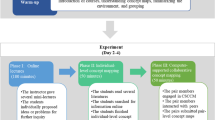Abstract
Learning outcomes of traditional pedagogy focus on memory of facts, problem-solving procedures, and multiple-choice or true/false questions. Pedagogy for conceptual thinking focuses on higher-order thinking skills, exploration of equivalence of meaning among ideas, and relationships between issues that denote commonality of meaning across representations. MERLO learning assessments capture these important aspects of conceptual thinking. In this chapter, we will look at how MERLO generates big data that can be used to assist teaching. ‘Big data’ for each student in large undergraduate class, include scores of MERLO CIFD weekly quizzes, mid-term tests, and final exams in individual courses. This data shows details of the evolution of deep understanding of each concept in the course, from weekly formative MERLO quizzes that reveal individual students’ conceptual strengths and weakness. This allows the instructor to suggest individual corrective measures with Interactive Concept Discovery (InCoD) in the course digital Knowledge Repository (KR), that are conducted and discussed by individual students with their peers, and enhance learning outcomes.
Access this chapter
Tax calculation will be finalised at checkout
Purchases are for personal use only
Similar content being viewed by others
References
Abhyankar, K., & Ganapathy, S. (2014). Technology-enhanced learning analytics system design for engineering education. International Journal of Information and Education Technology, 4(4), 345–350. https://doi.org/10.7763/IJIET.2014.V4.427
Bransford, J. D., Brown, A. L., & Cocking, R. R. (2004). How people learn: Brain, mind, experience, and school (expanded edition). National Academy Press.
Etkind, M., Kenett, R. S., & Shafrir, U. (2010). The evidence-based management of learning: Diagnosis and development of conceptual thinking with meaning equivalence reusable learning objects (MERLO). In Proceedings of the 8th International Conference on Teaching Statistics (ICOTS8). ICOTS.
Etkind, M., Kenett, R. S., & Shafrir, U. (2016). Learning in the digital age with meaning equivalence reusable learning objects (MERLO). In E. Railean, G. Walker, A. Elçi, & L. Jackson (Eds.), Handbook of research on applied learning: Theory and design in modern education (Vol. 1, pp. 310–333). IGI Global.
Lockyer, L., Heathcote, E., & Dawson, S. (2013). Informing pedagogical action: Aligning learning analytics with learning design. The American Behavioral Scientist, 57(10), 1439–1459. https://doi.org/10.1177/0002764213479367
Kittredge, R. I. (1983). Sematic processing of texts in restricted sublanguages. In N. J. Cercone (Ed.), Computational Linguistics (pp. 45–58). Pergamon Press.
OECD. (2013). Student assessment: Putting the learner at the centre. In Synergies for better learning: An International perspective on evaluation and assessment. OECD Publishing. https://doi.org/10.1787/9789264190658-7-en
Patricio, A. (2018). IDC: Expect 175 zettabytes of data worldwide by 2025. Retrieved October 29, 2019, from https://www.networkworld.com/article/3325397/idc-expect-175-zettabytes-of-data-worldwide-by-2025.html
Ripley, C., Etkind, M., & Shafrir, U. (2004). MERLO design studio workshop designer’s handbook: Teaching for deep comprehension with meaning equivalence reusable learning objects. In G. Rice & D. Baker (Eds.), Proceedings of the International Society for Exploring Teaching and Learning (ISETL) conference. ISETL.
Shafrir, U., & Etkind, M. (2005). Concept parsing algorithms: Mapping the conceptual content of disciplines (version 11.0, January, 2005). PARCEP.
Shafrir, U., & Etkind, M. (2006). eLearning for depth in the semantic web. British Journal for Educational Technology, 37(3), 425–444. https://doi.org/10.1111/j.1467-8535.2006.00614.x
Shafrir, U., & Etkind, M. (2018). Concept parsing algorithms (cpa) for textual analysis and discovery: Emerging research and opportunities. IGI Global.
Shafrir, U., Etkind, M., & Treviranus, J. (2006). eLearning tools for ePortfolios. In Handbook of Research on ePortfolios (Chapter xx, pp. 206–216).
Shafrir, U., & Kenett, R. S. (2016). Concept science evidence-based MERLO learning analytics. In E. Railean, G. Walker, A. Elçi, & L. Jackson (Eds.), Handbook of research on applied learning: Theory and design in modern education (Vol. 1, pp. 334–357). IGI Global.
Author information
Authors and Affiliations
Corresponding author
Editor information
Editors and Affiliations
Rights and permissions
Copyright information
© 2021 Springer Nature Switzerland AG
About this chapter
Cite this chapter
Etkind, M., Prodromou, T., Shafrir, U. (2021). Enhancing Learning Outcomes with ‘Big Data’ from Pedagogy for Conceptual Thinking with Meaning Equivalence Reusable Learning Objects (MERLO) and Interactive Concept Discovery (INCOD). In: Prodromou, T. (eds) Big Data in Education: Pedagogy and Research . Policy Implications of Research in Education, vol 13. Springer, Cham. https://doi.org/10.1007/978-3-030-76841-6_6
Download citation
DOI: https://doi.org/10.1007/978-3-030-76841-6_6
Published:
Publisher Name: Springer, Cham
Print ISBN: 978-3-030-76840-9
Online ISBN: 978-3-030-76841-6
eBook Packages: EducationEducation (R0)




